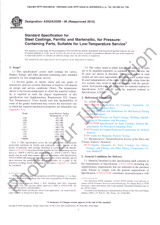Wir benötigen Ihre Einwilligung zur Verwendung der einzelnen Daten, damit Sie unter anderem Informationen zu Ihren Interessen einsehen können. Klicken Sie auf "OK", um Ihre Zustimmung zu erteilen.
ASTM D7153-22ae1
Standard Test Method for Freezing Point of Aviation Fuels (Automatic Laser Method) (Includes all amendments and changes 12/16/2022).
Name übersetzen
NORM herausgegeben am 1.10.2022
Informationen über die Norm:
Bezeichnung normen: ASTM D7153-22ae1
Ausgabedatum normen: 1.10.2022
SKU: NS-1097576
Zahl der Seiten: 10
Gewicht ca.: 30 g (0.07 Pfund)
Land: Amerikanische technische Norm
Kategorie: Technische Normen ASTM
Kategorie - ähnliche Normen:
Die Annotation des Normtextes ASTM D7153-22ae1 :
Keywords:
aviation turbine fuels, freezing point, wax crystals,, ICS Number Code 75.160.20 (Liquid fuels)
Ergänzende Informationen
| Significance and Use | ||||||||
|
5.1?The freezing point of an aviation fuel is the lowest temperature at which the fuel remains free of solid hydrocarbon crystals which, if present in the fuel system of the aircraft, can restrict the flow of fuel through filters. The temperature of the fuel in the aircraft tank normally decreases during flight depending on aircraft speed, altitude, and flight duration. The freezing point of the fuel shall always be lower than the minimum operational fuel temperature. 5.2?Petroleum blending operations require precise measurement of the freezing point. 5.3?This test method expresses results to the nearest 0.1 ?C, and it eliminates most of the operator time and judgment required by Test Method D2386. 5.4?When a specification requires Test Method D2386, do not substitute this test method or any other test method. |
||||||||
| 1. Scope | ||||||||
|
1.1?This test method covers the determination of the temperature below which solid hydrocarbon crystals may form in aviation turbine fuels. 1.2?This test method is designed to cover the temperature range of 80 ?C to 20 ?C; however, the interlaboratory study mentioned in 12.4 has only demonstrated the test method with fuels having freezing points in the range of 60 ?C to 42 ?C. 1.3?The values stated in SI units are to be regarded as standard. No other units of measurement are included in this standard. 1.4?This standard does not purport to address all of the safety concerns, if any, associated with its use. It is the responsibility of the user of this standard to establish appropriate safety, health, and environmental practices and to determine the applicability of regulatory limitations prior to use. 1.5?This international standard was developed in accordance with internationally recognized principles on standardization established in the Decision on Principles for the Development of International Standards, Guides and Recommendations issued by the World Trade Organization Technical Barriers to Trade (TBT) Committee. |
||||||||
| 2. Referenced Documents | ||||||||
|
Empfehlungen:
Aktualisierung der technischen Normen
Wollen Sie sich sicher sein, dass Sie nur die gültigen technischen Normen verwenden?
Wir bieten Ihnen eine Lösung, die Ihnen eine Monatsübersicht über die Aktualität der von Ihnen angewandten Normen sicher stellt.
Brauchen Sie mehr Informationen? Sehen Sie sich diese Seite an.




 Cookies
Cookies
